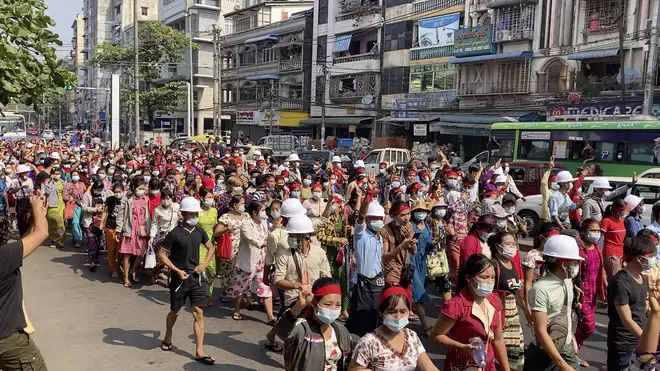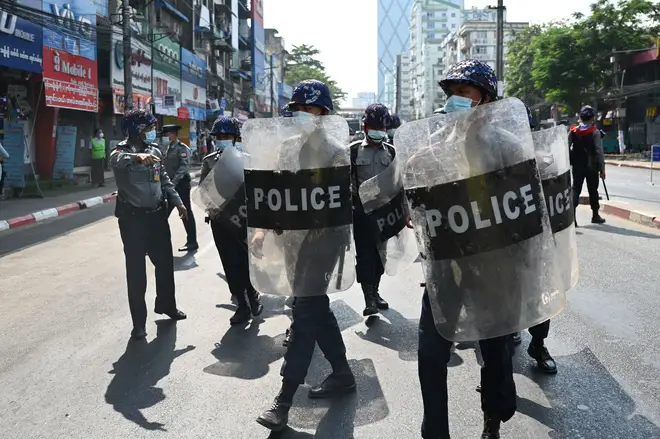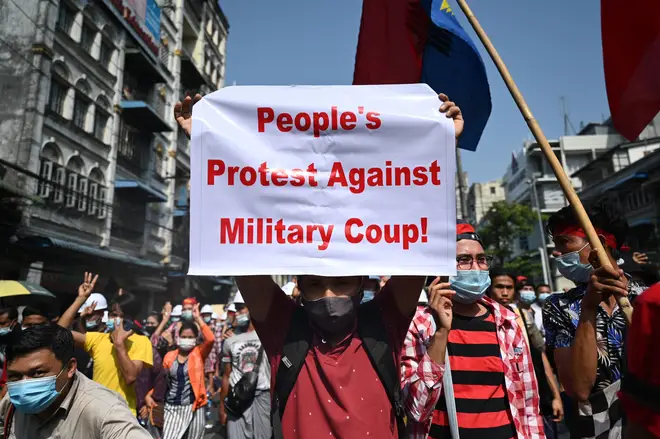
Clive Bull 1am - 4am
6 February 2021, 10:12

Myanmar's new military authorities appear to have cut most access to the internet as they face a rising tide of protest over the coup that toppled Aung San Suu Kyi's elected civilian government.
Numerous internet users noted a slow disappearance of services in Myanmar, especially from mobile service providers, which accelerated sharply on Saturday morning.
Broadband connection also failed, while there were mixed reports on whether landline telephone service are still working.
Netblocks, a London-based service that tracks internet disruptions and shutdowns, said "a near-total internet shutdown is now in effect" in Myanmar, with connectivity falling to just 16% of normal levels.
The outage followed Friday's government order to block Twitter and Instagram, with authorities saying that some people are trying to use the platforms to spread what is deemed fake news.
Facebook had already been blocked earlier in the week - though not completely effectively.

The communication blockages are a stark reminder of the progress Myanmar is in danger of losing after Monday's coup plunged the nation back under direct military rule after a nearly decade-long move towards greater openness and democracy.
During Myanmar's previous five decades of military rule, the country was internationally isolated and communication with the outside world strictly controlled.
Ms Suu Kyi's five years as leader since 2015 had been Myanmar's most democratic period despite the military retaining broad powers over the government, the continued use of repressive colonial-era laws and the persecution of minority Rohingya Muslims.
The blockages are also adding greater urgency to efforts to resist the coup, with Saturday seeing some of the largest street protests yet against the takeover.
In what appeared to be the main demonstration, about 1,000 protesters - factory workers and students prominent among them - marched down a main street in Yangon, the country's biggest city, and were met by more than 100 police in riot gear.

Members of the crowd shouted: "Military dictatorship should fall", and: "Down with dictatorship".
They marched with their hands in the air, formed into three-fingered salutes, a symbol of defiance adopted from protesters in neighbouring Thailand, who borrowed the gesture from the Hunger Games movie franchise.
The demonstration ended peacefully with no clashes reported.
It dispersed around the time communications were cut, and it is unclear if the marchers later regrouped.
Telenor Myanmar, a major mobile operator, confirmed it had received Friday's order to block Twitter and Instagram.
In a statement, Twitter said it was "deeply concerned" about the order and vowed to "advocate to end destructive government-led shutdowns".
A spokesperson said: "It undermines the public conversation and the rights of people to make their voices heard."
Since the coup, social media platforms have been major sources of independent news as well as organising tools for protests.
On Friday, for the fourth night, those opposed to the coup gathered at windows and on balconies around Yangon to make a cacophony of noise in protest.
Earlier, nearly 300 legislators from Aung San Suu Kyi's National League for Democracy party declared themselves as the sole legitimate representatives of the people and asked for international recognition for the country's government.
They were supposed to take their seats on Monday in a new session of parliament following the November election, when the military announced it was taking power for a year.
The military accuses Ms Suu Kyi and her party of failing to act on its complaints that the poll was marred by fraud, though the election commission said it had no found no evidence to support the claims.
In New York, UN Secretary-General Antonio Guterres pledged that the United Nations will do everything it can to unite the international community and create conditions for the military coup to be reversed.
He told a news conference it is "absolutely essential" to carry out the Security Council's calls for a return to democracy, to respect for the results of the November elections, and for the release of all people detained by the military.
Mr Guterres said Christine Schraner Burgener, the UN special envoy for Myanmar, had a first contact with the military since the coup and expressed the UN's strong opposition to the takeover.
She reiterated to deputy commander-in-chief vice general Soe Win "the secretary-general's strong condemnation of the military's action that disrupted the democratic reforms that were taking place in the country".
In addition to 134 officials and legislators who were detained in the coup, some 18 independent activists were also held, according to the Assistance Association for Political Prisoners in Myanmar. Some were released later.
On Friday, Ms Suu Kyi's senior aide, Win Htein, was picked up in Mayangone township. He told BBC in a phone call earlier that he was being arrested for sedition, which carries a maximum penalty of life imprisonment.
Ms Suu Kyi and President Win Myint are also under house arrest and have been charged with minor offences, seen by many as merely providing a legal veneer for their detention.
Her party said Ms Suu Kyi is in good health.